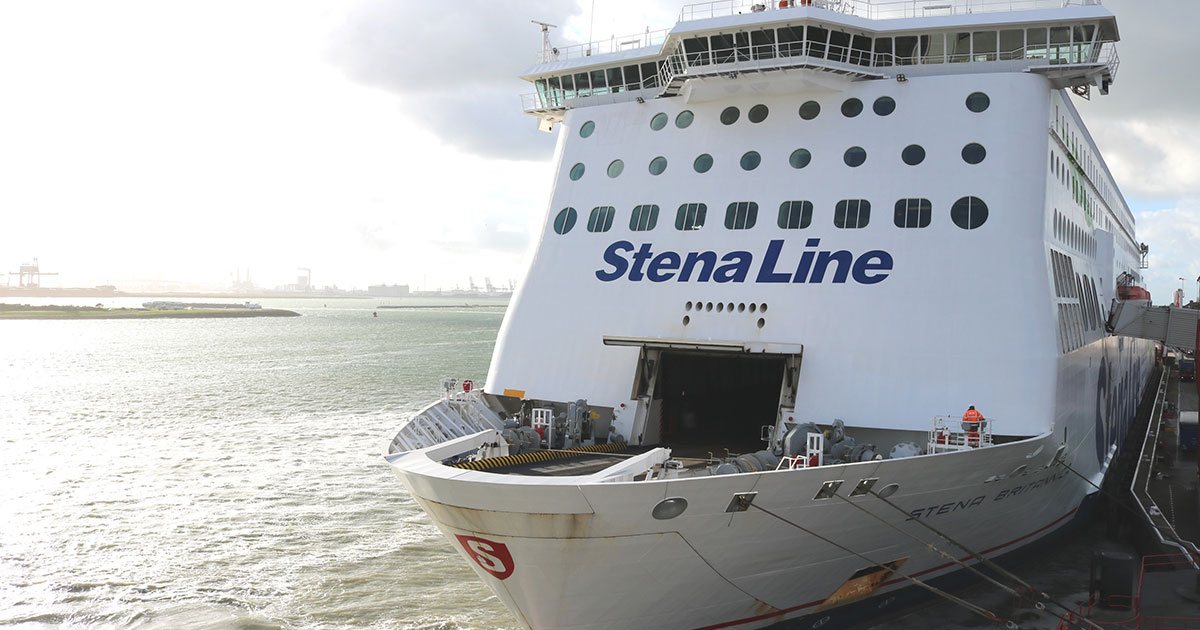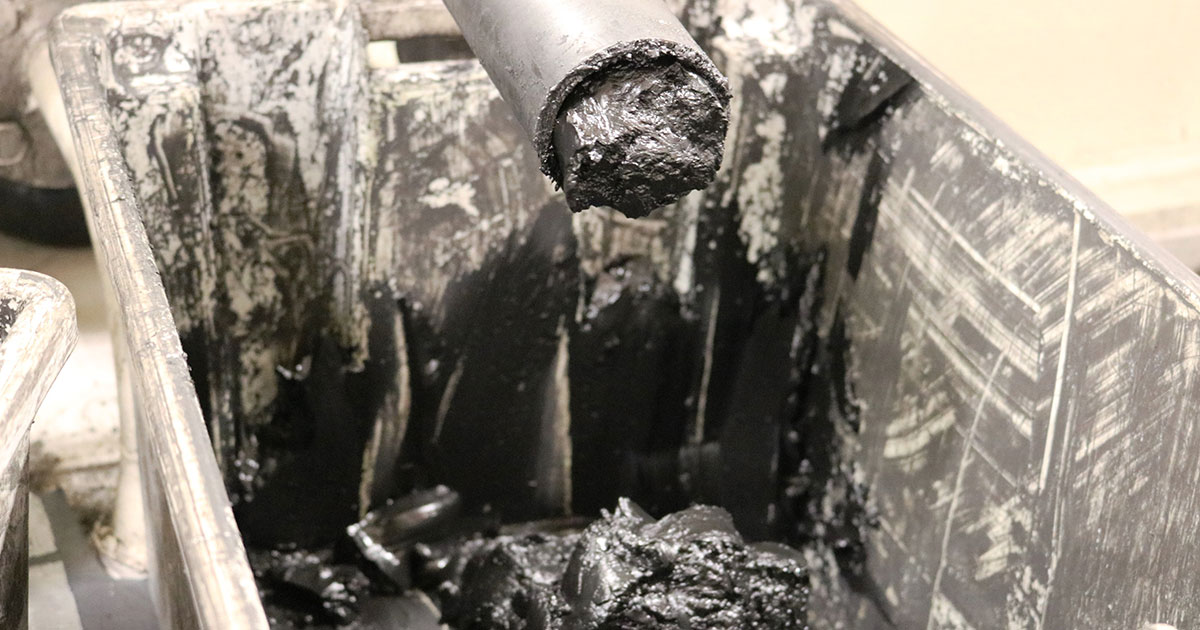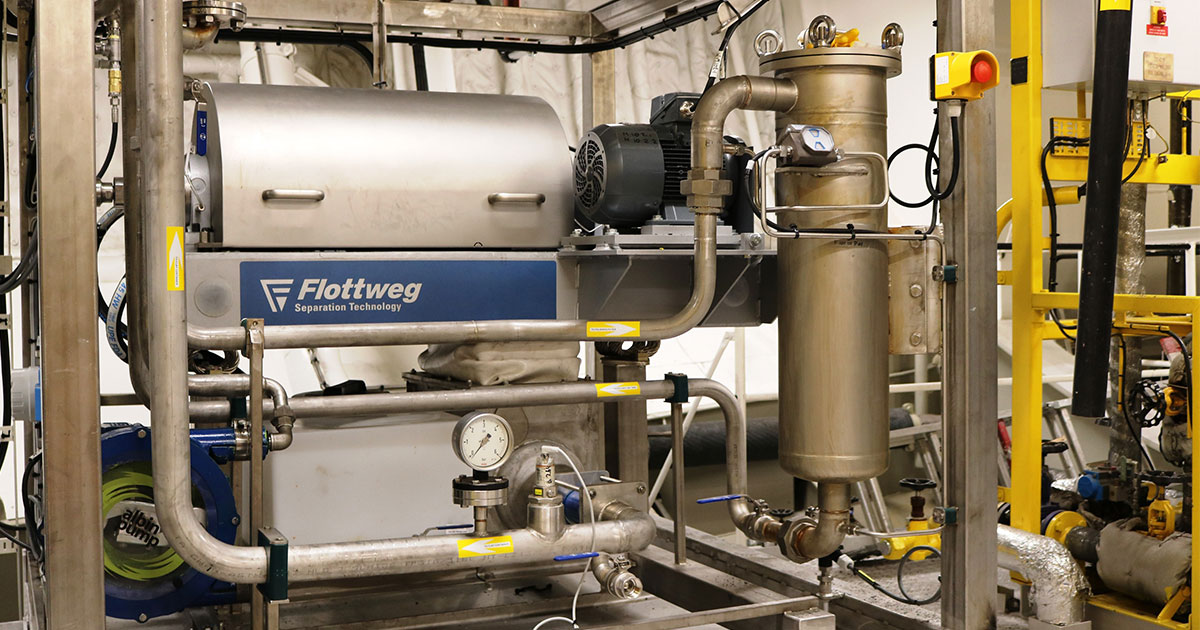2021-07-25
No More Smoke on the Water
Whereas environmental protection on land and in areas of high population density are very prevalent today, the shipping industry has until now been allowed many environmental offenses. But now, ship operators must clean their exhaust gases in order to sustainably protect the oceans. Decanter centrifuges made by Flottweg enable Stena Line to thoroughly treat the resulting sludge from froth flotation and to significantly reduce the volume of the sludge. By dehydrating the solids, this hazardous waste can be temporarily stored in containers on the ship in order to dispose of it in an environmentally safe manner at the nearest port.
 Modern shipping companies use exhaust gas cleaning systems to significantly reduce particulate and sulfur emissions.
Modern shipping companies use exhaust gas cleaning systems to significantly reduce particulate and sulfur emissions. According to the German Federal Environmental Agency, approximately 40,000 merchant ships are traversing the world's oceans, in addition to scores of ferries and giant cruise ships. In international trade alone, shipping holds an undisputed top position at 90 percent. In terms of environmental protection, however, it is far from the top position with its high emissions. This needs to be changed. With stricter guidelines from the International Maritime Organization (IMO), the oceans will be better protected in the future from the stresses of high particulate and sulfur emissions. Starting in 2020, the sulfur content of the fuel that ships burn on the high seas must be reduced to 0.5 percent instead of the current 3.5 percent in order to meet these emissions limits. Restrictions for the North and Baltic Seas are already at the forefront of these new limits: a sulfur limit value of 0.1 percent has applied here since 2015. But it could still be better.
Reducing Shipping Emissions in a Cost-Efficient Manner
In order to comply with the stricter limits, shipping companies would have to use high-qrade marine diesel fuel oil instead of lower-cost heavy fuel oil. However, marine diesel fuel is significantly more expensive. That is why many ship operators are relying on a more cost-effective and already tried-and-tested alternative. Installing wet washers for exhaust gas cleaning, known as scrubbers, in their exhaust systems makes it possible to comply with the required emissions limits.
These scrubbers achieve the required emissions reduction, but they also generate wastewater, which must be cleaned before discharge using a closed loop scrubber. Different scrubber systems differ in their environmental impact.
The Northern European ferry company Stena Line also uses scrubber systems to clean their sources of emissions. Stena Line operates, among other water transportation, eight ferries that run daily from Hoek van Holland in the Netherlands to Harwich and Killingholme in England.
During the cleaning process with scrubbers, the gases in the exhaust system are cleaned using treated seawater, thereby binding large parts of the exhaust gas particles, such as heavy metals, soot and HC emissions.
The wash water from the gas scrubbing will, depending on the amount of contamination, be removed and sent on to the cleaning stage of a froth flotation system.
Scrubber systems from the company Wärtsilä are used on the large ferries of Stena Line. In this system, the contaminated gas scrubbing water is cleaned in a specially developed froth flotation device called a BOTU (Bleed Off Treatment Unit). This purified water meets emissions requirements and can be discharged directly into the ocean.
However, this process has a distinct disadvantage: The large-volume, still-liquid froth flotation sludge must be temporarily stored in a tank before it can be disposed of in a port. The amount of sludge remaining to be disposed is still large and the solids in the tank tend to form deposits. The handling of this material is correspondingly complex and expensive - the key is to find a solution.
 The de-hydrated sludge is temporarily stored in small containers and is then disposed of properly on the mainland.
The de-hydrated sludge is temporarily stored in small containers and is then disposed of properly on the mainland.Optimal Separation of Solids and Liquids with a Decanter Centrifuge
The goal of Stena Line was to significantly reduce the amount of residual sludge. In order to do this, the solids and liquid in the sludge needed to be further separated - but how?
Stena Line independently examined a variety of procedures in the technical development stage.
The solution is to use what is called a decanter. The advantages to using a decanter compared to other separation processes are that they require a small amount of space, avoid emissions and require only minimal operating effort with their continuous, automatic operation. Stena Line has decided to use high-quality decanter centrifuges made in Germany for its larger ships. During the development and optimization phase, a used model, type Z1L, built in 1985 was initially installed on Stena Transit vessels. For the large Stena Line ferries - the Brittanica and the Hollandica - the company is already implementing the design of the Flottweg Decanter-Modells Z23-3/401. Equipped with the same functionality but using modern control technology, these machines were integrated into the sludge treatment regimen.
With the model Z2E-4/4X1 a completely new machine is now available for this application. This optimized design, with slightly larger drum volume contains all of the improvements of the new Z2 series.
 Flottweg decanters reduce the sludge from the exhaust gas cleaning directly on-board, saving significant costs.
Flottweg decanters reduce the sludge from the exhaust gas cleaning directly on-board, saving significant costs.The Functionality of the Decanter – Simple and Ingenious
The decanter is at the end of the cleaning process. The latest full-bowl centrifuge from Flottweg processes the froth flotation sludge from the BOTU directly on-board.
Fed through a centrally-located inlet pipe, the sludge passes through to the inlet space of the screw and, after gentle pre-acceleration, goes through the distribution openings in the drum. The drum has a cylindrical/conical shape and rotates at a carefully calibrated speed. In this way, when the full rotational speed is reached, the sludge becomes attached to drum shell as a cylindrical ring. Thus, under the influence of centrifugal force the solids settle on the inner wall of the drum. At the same time, a screw rotates in the interior at a lower differential speed relative and moves the settled solids toward the conically-narrowed end of the drum, where they are discharged downward. This relatively dry sludge is collected and disposed of in a port. The clarified liquid flows to the cylindrical end of the drum, where it runs out through openings in the drum cover, clean and depressurized.
Operational safety as well as a long service life are absolutely guaranteed, since Flottweg uses only high-quality rust and acid-resistant stainless steel for all its product-contacted components. Therefore, the drum is made of his-strength duplex centrifugal casting and the screw body is made of stainless steel centrifugal casting. This provides optimal protection against corrosion, which is incredibly important for highly-aggressive residues generated from the exhaust gas scrubbing.
The success of the process is also fast on the high seas: If the sludge layer after the BOTU process with 2% TS by weight % still contains a large amount of aqueous material, the decanter drains about 20-22% TS by weight %. The cleaned aqueous phase is released with the cleaned water from the froth flotation so that only a very small residual amount of sludge remains: Thanks to the process, it was possible to achieve a reduction of 500 kg/h to 45 kg/h (0.09) - with a corresponding minimizing of the volume.
The small amount of remaining sludge fits into a small container, which can easily be taken off board. It is disposed of in the port of Rotterdam. The decanter is a huge success, not only from an environmental point of view, but also economically. And the disposal process is significantly optimized, since there is no more weekly disposal by truck. The cost savings are therefore significant.
Stena Line is also pleased that the Flottweg Back Drive System is so easy to handle and that the integrated torque-dependent screw speed control prevents clogging, even with fluctuating solids loads. The latest control system offers a quick overview of the operating status of the entire de-watering unit.
“Our goal is to optimize the process of solids separation,” says Peter Polifka, Sales Industrial Waste Water, Minerals and Oil at Flottweg. “With support from a competent customer like Stena Line, we will continue to work on new process variants and improvements to decanter application in the area of bleed off treatment.”
Simple and Universal Use of the Decanter
Compared to other separation processes, decanter technology is generally convincing with its simple operability and high level of flexibility. No cleaning cycle is required during operation. The machine is effectively protected from wear, which is why there is also only a minimum requirement for maintenance and replacement parts. In addition, no additional waste is generated, since the decanter centrifuges from Flottweg do not require any filter aids or cloths. Programmable logic controls or remote monitoring can be used to automatically adjust the variable feed devices and operating conditions during operation. Additional advantages are the small space requirement and the closed design, which is how no emissions are released into the environment. Thanks to the choice of materials, Flottweg decanters are designed for a long service life. The duplex materials Flottweg uses help to avoid corrosion. This makes the use of the modular model series particularly suitable for the loads from sodium chloride and sulfur. The simplified handling for disposal of residual sludge also results in significant cost savings.
About the Authors
Nils Engelke
Nils Engelke is PR and Communications Manager at Flottweg SE
Peter Polifka
Peter Polifka is Sales Engineer at Flottweg SE and expert for industrial sludge and waste water.
